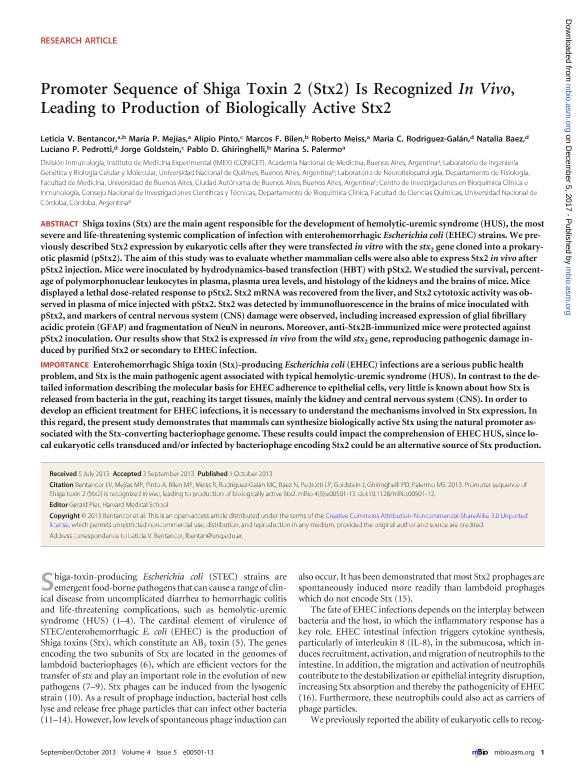Artículo
Promoter sequence of Shiga Toxin II (Stx2) is recognized in vivo leading to the production of biologically active Stx2
Bentancor, Leticia Veronica ; Mejias, Maria Pilar
; Mejias, Maria Pilar ; Pinto, Alípio; Bilen, Marcos Fabian
; Pinto, Alípio; Bilen, Marcos Fabian ; Meiss, Roberto; Rodriguez Galan, Maria Cecilia
; Meiss, Roberto; Rodriguez Galan, Maria Cecilia ; Baez, Natalia Soledad; Pedrotti, Luciano Pablo
; Baez, Natalia Soledad; Pedrotti, Luciano Pablo ; Goldstein Raij, Jorge
; Goldstein Raij, Jorge ; Ghiringhelli, Pablo Daniel
; Ghiringhelli, Pablo Daniel ; Palermo, Marina Sandra
; Palermo, Marina Sandra
 ; Mejias, Maria Pilar
; Mejias, Maria Pilar ; Pinto, Alípio; Bilen, Marcos Fabian
; Pinto, Alípio; Bilen, Marcos Fabian ; Meiss, Roberto; Rodriguez Galan, Maria Cecilia
; Meiss, Roberto; Rodriguez Galan, Maria Cecilia ; Baez, Natalia Soledad; Pedrotti, Luciano Pablo
; Baez, Natalia Soledad; Pedrotti, Luciano Pablo ; Goldstein Raij, Jorge
; Goldstein Raij, Jorge ; Ghiringhelli, Pablo Daniel
; Ghiringhelli, Pablo Daniel ; Palermo, Marina Sandra
; Palermo, Marina Sandra
Fecha de publicación:
01/10/2013
Editorial:
American Society for Microbiology
Revista:
mBio
ISSN:
2150-7511
Idioma:
Inglés
Tipo de recurso:
Artículo publicado
Clasificación temática:
Resumen
Shiga toxins (Stxs) are the main agent responsible for the development of hemolytic uremic syndrome (HUS), the most severe and life-threatening systemic complication of infection with enterohemorrhagic Escherichia coli (EHEC) strains. We previously reported Stx2 expression by eukaryotic cells after they were transfected in vitro with the stx2 gene cloned into a prokaryotic plasmid (pStx2). The aim of this study was to evaluate whether mammalian cells were also able to express Stx2 in vivo after pStx2 injection. Mice were inoculated by hydrodynamic based transfection (HBT) with pStx2. We studied the survival, the percentage of polymorphonuclear leukocytes in plasma, plasma urea levels and histology of the kidney and the brain of mice. Mice displayed a lethal dose-response to pStx2. Stx2-mRNA was recovered from the liver and Stx2 cytotoxic activity was observed in plasma of mice injected with pStx2. Stx2 was detected by immunofluorescence in the brains of mice inoculated with pStx2, and markers of central nervous system (CNS) damage were observed, including increased expression of glial fibrillary acidic protein (GFAP) and fragmentation of NeuN in neurons. Moreover, anti-Stx2B immunized mice were protected against pStx2 inoculation. Our results show that Stx2 is expressed in vivo from the wild stx2 gene, reproducing pathogenic damage induced by purified Stx2 or secondary to EHEC-infection.
Archivos asociados
Licencia
Identificadores
Colecciones
Articulos(CIBICI)
Articulos de CENTRO DE INV.EN BIOQUI.CLINICA E INMUNOLOGIA
Articulos de CENTRO DE INV.EN BIOQUI.CLINICA E INMUNOLOGIA
Articulos(IMEX)
Articulos de INST.DE MEDICINA EXPERIMENTAL
Articulos de INST.DE MEDICINA EXPERIMENTAL
Articulos(OCA HOUSSAY)
Articulos de OFICINA DE COORDINACION ADMINISTRATIVA HOUSSAY
Articulos de OFICINA DE COORDINACION ADMINISTRATIVA HOUSSAY
Articulos(SEDE CENTRAL)
Articulos de SEDE CENTRAL
Articulos de SEDE CENTRAL
Citación
Bentancor, Leticia Veronica; Mejias, Maria Pilar; Pinto, Alípio; Bilen, Marcos Fabian; Meiss, Roberto; et al.; Promoter sequence of Shiga Toxin II (Stx2) is recognized in vivo leading to the production of biologically active Stx2; American Society for Microbiology; mBio; 4; 5; 1-10-2013; 1-13
Compartir
Altmétricas



